As India prepares to pick up the pieces from the horrific attacks in Mumbai last week, the world sends their collective thoughts and prayers to the families of the victims and a hope that an end to such senseless acts of violence will one day run its course. 10 men, each carrying 7 bullet magazines containing 30 rounds with an additional loose 400 rounds strapped into an AK-47 produced enough carnage on November 26, 2008 to earn the dubbing “India’s 9/11” while striking fear into the hearts of the second most populated country on the planet. Hundreds of civilians are confirmed dead, hundreds more injured and India now finds itself in an escalating situation which just fans the flame of the already tense relationship with Pakistan. But as the dust settles and a nation moves forward, the United States can sympathize with India and even offer the unenviable notion that on this particular instance, we know what they’re going through.
We’ve been there, India. We cried. We searched for meaning. We supported one another. And in the end, the United States got through it as one. But in the days since the Mumbai attacks, the rightful question which is most likely on the mind of every Indian is: “How?”
In the weeks following the September 11th attacks, all major sporting events were canceled or postponed to pay respect for those who lost their lives at the World Trade Center and The Pentagon. People from all walks of life put aside their differences and came together to mourn the tragedy in a sense of nationalistic pride that had not been felt since World War II. Out of respect for the victims, the nation struggled to regain a sense of normalcy without showing any signs of disrespect to the fallen.
That normalcy came through sports.
The Twenty20 Champions Cricket League, a Cricket tournament that was supposed to have it’s inaugural play on December 3, 2008, was postponed following the attacks and scheduled to a later date in 2009. The highly anticipated tournament is comprised of 10 teams representing 5 countries: India, Pakistan, Australia, England and South Africa and slated to be a tremendous success. Chairman Lalit Modi even inked a staggering $975 million broadcast and global commercial rights contract with ESPN Star Sports until 2017. Though it may be incomprehensible at the moment to even think about staging a sporting event, India can learn from the United States as sports, particularly baseball, gave us an outlet from the atrocities, and paved the way for redemption and renewal. It gave us hope that better days await.
There is no disputing that baseball, more than any other sport in the United States, is the most “American.” Say what you will about the pace of the game, the inflated salaries or the steroid scandal, baseball is embedded deep in the soul of this country as it permeates the fabric of Americana. After 9/11, attendance for MLB games skyrocketed as Americans craved something innocent after witnessing vileness at it’s most vile. People grasped on to that last refuge of peace that was personified in baseball.
In the wake of the Mumbai attacks, the same will shine through in India. When the Twenty20 Champions League resumes, their national pastime will once again bring an escape, solidarity, and (dare I say it), a sense of joy to a nation that is in a tremendous amount of pain right now. Though those who perished will never be forgotten, they will be honored as time goes on and as their beloved Cricketeers represent them. In the violent world in which we live, the parallel between sports and prosperity should never be forgotten.
However, that being said, when senseless, avoidable violence, hatred and guns clash within the world of sports, then something is very wrong.
I hope you’re reading, Plaxico.

2 replies on “Hope Will Rise…”
How much agents gets pay in Korea and China, if I get a baseball player over there
Sorry my friend, I;m Just a writer. That question would be better suited for the founder and editor of this site, as well as our resident Agent, Darren Heitner.